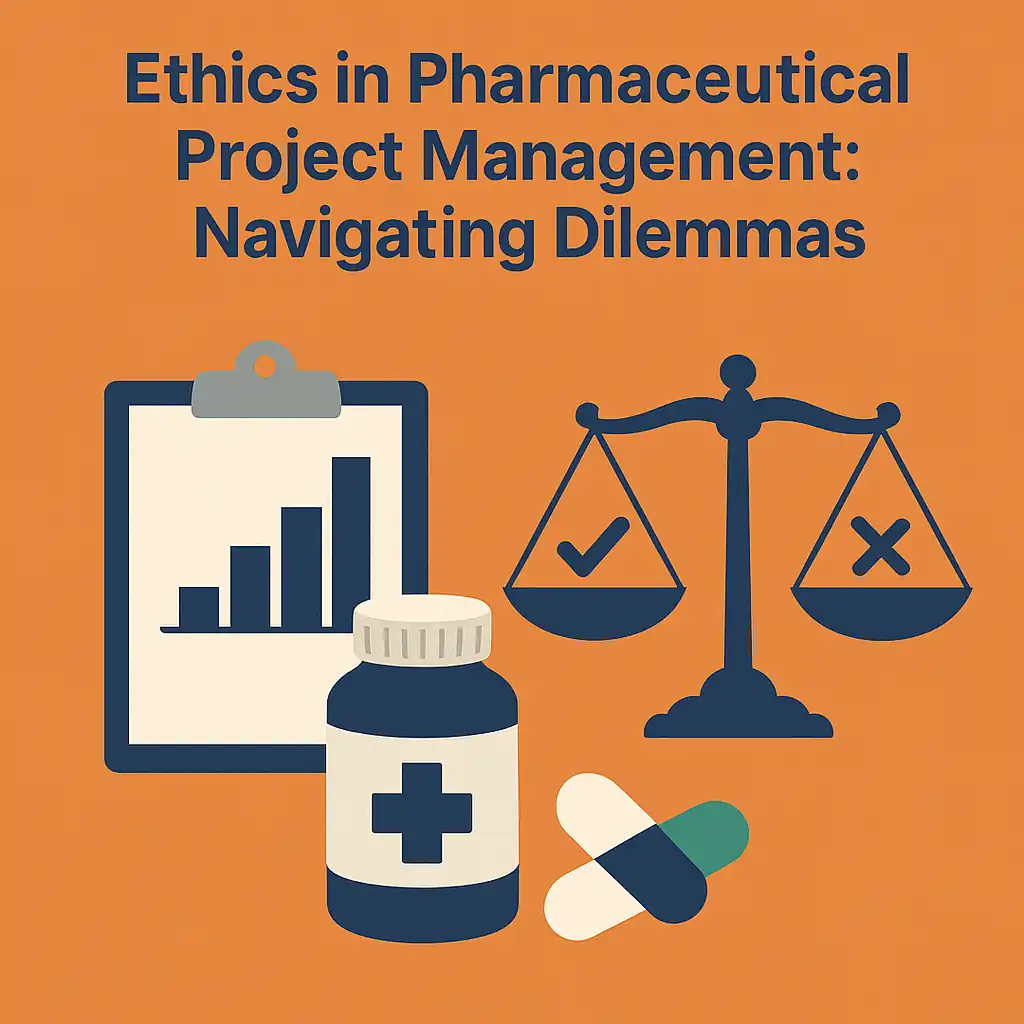Introduction
In the pharmaceutical industry, the role of a project manager is pivotal in steering projects from conception to completion, ensuring that they align with both organizational goals and regulatory requirements. Project managers in this sector are responsible for coordinating cross-functional teams, managing timelines, and overseeing budgets while ensuring compliance with stringent industry standards. Their work often involves navigating complex processes, including drug development, clinical trials, and regulatory submissions, which require a keen understanding of both project management principles and the specific nuances of the pharmaceutical landscape.
Ethics play a crucial role in project management, particularly in the pharmaceutical sector, where the stakes are high, and the implications of decisions can significantly impact public health. Ethical considerations guide project managers in making decisions that not only fulfill business objectives but also prioritize patient safety, data integrity, and transparency. The importance of ethics in this field cannot be overstated, as it fosters trust among stakeholders, including patients, healthcare providers, and regulatory bodies, and ensures that the projects undertaken are conducted with the highest moral standards.
The pharmaceutical industry presents unique challenges that can complicate ethical decision-making for project managers. These challenges include balancing profit motives with patient care, navigating conflicts of interest, and addressing issues related to resource allocation. For instance, project managers may face dilemmas when determining how to allocate limited resources among competing projects or when making decisions that could affect drug pricing and accessibility. Additionally, the pressure to deliver results in a highly competitive market can lead to ethical conflicts, making it essential for project managers to be equipped with the tools and frameworks necessary to navigate these dilemmas effectively. By understanding and addressing these ethical challenges, project managers can uphold their professional responsibilities while contributing to the advancement of healthcare solutions.
Understanding Ethical Frameworks in Pharma
In the pharmaceutical industry, project managers are often confronted with complex ethical dilemmas that require a solid understanding of ethical frameworks and regulatory guidelines. This section aims to provide an overview of the key ethical principles relevant to project management in this sector, emphasizing the importance of patient safety and data integrity.
Key Ethical Frameworks
- Utilitarianism: This framework focuses on the outcomes of actions, advocating for decisions that maximize overall happiness or benefit. In pharmaceutical project management, utilitarianism can guide project managers in evaluating the potential benefits of a drug against its risks, ensuring that the greater good is prioritized in decision-making processes.
- Deontology: Deontological ethics emphasizes the importance of rules and duties. Project managers in the pharmaceutical industry must adhere to strict ethical guidelines and regulations, ensuring that their actions align with established moral principles, regardless of the outcomes. This approach is crucial when considering patient rights and the ethical obligations to conduct thorough clinical trials.
- Virtue Ethics: This framework centers on the character and virtues of the decision-maker rather than on rules or consequences. Project managers are encouraged to cultivate virtues such as honesty, integrity, and empathy, which are essential in fostering trust among stakeholders and ensuring ethical conduct throughout the project lifecycle.
Regulations and Guidelines
Pharmaceutical project managers must navigate a landscape shaped by various regulations and guidelines that govern their work. Key regulatory bodies and frameworks include:
- FDA (Food and Drug Administration): The FDA sets forth stringent regulations for drug development, approval, and marketing. Project managers must ensure compliance with these regulations to maintain the integrity of the project and safeguard public health.
- ICH (International Council for Harmonisation): The ICH provides guidelines that promote international harmonization of drug development practices. Adhering to ICH guidelines helps project managers align their projects with global standards, ensuring ethical practices in clinical trials and data management.
Importance of Patient Safety and Data Integrity
Maintaining patient safety and data integrity is paramount in pharmaceutical project management. Ethical considerations in this area include:
- Patient Safety: Project managers must prioritize the well-being of patients involved in clinical trials. This involves rigorous monitoring of adverse effects and ensuring that informed consent is obtained, thereby upholding ethical standards in research.
- Data Integrity: Ensuring the accuracy and reliability of data collected during clinical trials is critical. Project managers must implement robust data management practices to prevent manipulation or misrepresentation of results, which can have serious implications for patient safety and regulatory compliance.
Common Ethical Dilemmas Faced by Project Managers
Project managers in the pharmaceutical sector encounter a unique set of ethical dilemmas that require careful navigation to ensure both compliance and integrity. Here are some of the most pressing ethical considerations they face:
- Balancing Profit Motives with Patient Welfare: One of the primary ethical challenges is the tension between the financial objectives of pharmaceutical companies and the welfare of patients. Project managers must ensure that the pursuit of profit does not compromise the safety and efficacy of medications. This dilemma often arises in decisions regarding drug pricing, where high costs can limit patient access to essential treatments, raising questions about the ethical implications of prioritizing profit over patient care [7][8].
- Handling Conflicts of Interest Among Stakeholders: The pharmaceutical industry is rife with potential conflicts of interest, particularly among stakeholders such as researchers, healthcare providers, and regulatory bodies. Project managers must navigate these conflicts to maintain the integrity of clinical trials and ensure that decisions are made in the best interest of patients rather than influenced by personal or financial interests. This requires establishing clear guidelines and fostering an environment of transparency and accountability [6][10].
- Navigating Transparency vs. Confidentiality in Clinical Trials: Clinical trials are essential for the development of new drugs, but they also raise ethical questions about transparency and confidentiality. Project managers must balance the need for transparency in reporting trial results with the obligation to protect sensitive patient data. This dilemma is particularly acute when negative results could impact a company’s reputation or financial standing, leading to potential ethical breaches in data reporting [1][4].
- Addressing Issues of Data Manipulation and Reporting: The integrity of data is crucial in the pharmaceutical industry, yet there are instances where project managers may face pressure to manipulate or selectively report data to favor a product. This ethical dilemma can undermine trust in clinical research and lead to harmful consequences for patients. Project managers must uphold rigorous ethical standards and foster a culture of honesty and integrity in data management and reporting practices [2][8][9].
Case Studies: Ethical Dilemmas in Action
In the pharmaceutical industry, project managers often encounter complex ethical dilemmas that can significantly impact their projects and the broader healthcare landscape. This section explores notable ethical controversies, analyzes the decision-making processes of project managers involved, and discusses the outcomes and lessons learned from these situations.
Notable Ethical Controversies
- High Drug Costs and Distributive Justice: A significant ethical concern in the pharmaceutical sector revolves around the high costs of medications. Project managers must navigate the tension between the need for profitability and the moral obligation to ensure access to essential drugs for patients. This dilemma raises questions about distributive justice, where the fair distribution of resources is at stake [9].
- Informed Consent Practices: Ethical issues often arise regarding informed consent, particularly in clinical trials. Project managers must ensure that participants are fully aware of the risks and benefits of their involvement. Failure to uphold ethical standards in this area can lead to serious repercussions, including legal action and damage to the company’s reputation [8].
- Placebo Use in Trials: The use of placebos in clinical trials presents another ethical challenge. Project managers must balance the scientific validity of using a placebo against the ethical implications of withholding treatment from participants. This situation requires careful consideration of the potential benefits and harms to participants [8].
Decision-Making Processes
In navigating these ethical dilemmas, project managers often employ structured decision-making frameworks. These frameworks help guide their choices by:
- Evaluating Options: Project managers assess various alternatives, considering the ethical implications of each choice. This systematic approach allows for a more thorough analysis of potential outcomes [11].
- Consulting Stakeholders: Engaging with stakeholders, including ethics officers, legal teams, and patient advocacy groups, can provide valuable insights and perspectives that inform ethical decision-making [13].
- Prioritizing Transparency: Open communication about the decision-making process fosters trust among stakeholders and can mitigate potential backlash from ethical controversies [13].
Outcomes and Lessons Learned
The outcomes of ethical dilemmas in pharmaceutical project management can vary widely, but several key lessons can be drawn from these cases:
- Importance of Ethical Guidelines: Establishing and adhering to clear ethical guidelines is crucial for navigating dilemmas effectively. Companies that prioritize ethics often experience better long-term outcomes, including enhanced reputation and stakeholder trust [10].
- Need for Continuous Training: Ongoing education and training in ethical decision-making for project managers can help prepare them for the complexities of the pharmaceutical landscape. This proactive approach can lead to more informed and ethical choices [15].
- Emphasis on Collaboration: Ethical dilemmas often arise from conflicting interests or limited resources. By fostering collaboration among team members and stakeholders, project managers can develop more ethical solutions that align with the company’s values and mission [13].
Strategies for Ethical Decision-Making
In the pharmaceutical industry, project managers face a myriad of ethical dilemmas that can significantly impact public health and the integrity of their organizations. To navigate these challenges effectively, it is essential to adopt actionable strategies that promote ethical decision-making within project teams. Here are some key strategies:
- Establishing a Clear Ethical Framework: It is crucial for project managers to develop and communicate a robust ethical framework that aligns with both the company’s values and societal expectations. This framework should serve as a guiding principle for all project-related decisions, ensuring that actions are consistent with ethical standards and the well-being of stakeholders involved [1][2]. By clearly defining ethical guidelines, project teams can better navigate complex situations and make informed choices.
- Encouraging Open Communication and Reporting Mechanisms: Fostering an environment where team members feel comfortable discussing ethical concerns is vital. Project managers should implement open communication channels that allow for the reporting of ethical dilemmas without fear of retaliation. This transparency not only helps in identifying potential issues early but also promotes a culture of accountability and ethical responsibility within the team [1][12].
- Incorporating Stakeholder Feedback into Decision-Making: Engaging with various stakeholders—including researchers, healthcare professionals, and patients—can provide valuable insights into the ethical implications of project decisions. By actively seeking and incorporating feedback from these groups, project managers can ensure that their decisions reflect a broader perspective and address the needs and concerns of all parties involved [1][15]. This collaborative approach can enhance the ethical integrity of project outcomes.
- Implementing Training Programs on Ethical Standards and Practices: Continuous education on ethical standards is essential for project managers and their teams. By providing training programs that focus on ethical decision-making, project managers can equip their teams with the knowledge and skills necessary to handle ethical dilemmas effectively. These programs should cover relevant legislation, industry standards, and case studies that illustrate ethical challenges in the pharmaceutical sector [1][11]. Regular training not only reinforces the importance of ethics but also empowers team members to act confidently in complex situations.
By integrating these strategies into their project management practices, pharmaceutical project managers can navigate ethical dilemmas more effectively, ensuring that their decisions uphold the highest ethical standards while advancing public health objectives.
The Role of Ethics Officers in Pharmaceutical Projects
In the pharmaceutical industry, the role of ethics officers is crucial in ensuring that project managers navigate the complex landscape of ethical dilemmas effectively. These professionals are tasked with upholding the integrity of the organization while guiding project managers through the ethical considerations inherent in their work. Here are the key aspects of their role and responsibilities:
- Definition and Responsibilities: Ethics officers are responsible for developing, implementing, and overseeing ethical policies and practices within pharmaceutical projects. They ensure compliance with regulatory standards and ethical guidelines, which are essential in maintaining public trust and safeguarding the welfare of patients. Their duties include conducting training sessions, providing resources for ethical decision-making, and serving as a point of contact for ethical concerns that may arise during a project [4][8].
- Collaboration with Project Managers: The relationship between ethics officers and project managers is collaborative and integral to the success of pharmaceutical projects. Ethics officers work closely with project managers to identify potential ethical issues early in the project lifecycle. This collaboration involves regular meetings to discuss ongoing projects, assess risks, and develop strategies to address ethical dilemmas. By fostering open communication, ethics officers help project managers make informed decisions that align with both organizational values and regulatory requirements [1][12].
- Fostering a Culture of Accountability: Ethics officers play a vital role in promoting a culture of accountability within pharmaceutical organizations. They encourage project managers to prioritize ethical considerations in their decision-making processes, thereby reinforcing the importance of integrity and transparency. By establishing clear ethical standards and providing support, ethics officers help create an environment where ethical behavior is recognized and rewarded. This culture not only enhances the reputation of the organization but also contributes to better project outcomes and stakeholder trust [3][8][11].
Future Trends in Ethical Project Management in Pharma
As the pharmaceutical industry continues to evolve, project managers are increasingly confronted with ethical dilemmas that require careful navigation. The integration of emerging technologies, the emphasis on corporate social responsibility (CSR), and the shifting regulatory landscape are all shaping the future of ethical project management in this sector. Here are some key trends to consider:
1. Emerging Technologies and Their Ethical Implications
The rise of technologies such as artificial intelligence (AI), big data, and the Internet of Things (IoT) is transforming the pharmaceutical landscape. While these technologies offer significant benefits, they also present ethical challenges:
- Data Privacy and Security: With the increasing reliance on big data for decision-making, project managers must ensure that patient data is handled ethically and securely. This includes compliance with regulations regarding data protection and patient consent, which are becoming more stringent as technology advances [6][8].
- Bias in AI Algorithms: The deployment of AI systems in clinical practice raises concerns about bias and fairness. Project managers need to be vigilant about the ethical implications of AI, ensuring that algorithms are developed and implemented in a way that does not perpetuate existing inequalities in healthcare [5][9].
2. The Growing Importance of Corporate Social Responsibility (CSR)
Corporate social responsibility is becoming a critical component of ethical project management in the pharmaceutical industry. As stakeholders increasingly demand transparency and accountability, project managers must prioritize CSR initiatives:
- Patient-Centric Approaches: Emphasizing patient welfare and community health is essential. Project managers should advocate for practices that prioritize patient needs and outcomes, aligning project goals with broader societal benefits [1][8].
- Sustainability Practices: The pharmaceutical industry is under pressure to adopt sustainable practices. Project managers must integrate environmental considerations into project planning and execution, ensuring that their projects contribute positively to society and the environment [4][8].
3. Shifts in Regulatory Environments and Their Impact on Ethical Practices
The regulatory landscape for pharmaceuticals is continuously evolving, which directly impacts ethical project management:
- Stricter Compliance Requirements: As regulations become more stringent, project managers must stay informed about changes and ensure that their projects comply with new standards. This includes understanding the implications of regulations on patient safety, drug efficacy, and ethical marketing practices [6][8].
- Focus on Personalized Medicine: The shift towards personalized medicine necessitates a reevaluation of ethical practices. Project managers must navigate the complexities of developing targeted therapies while ensuring equitable access and ethical considerations in clinical trials [6][8].
Conclusion
In the realm of pharmaceutical project management, the significance of ethics cannot be overstated. Project managers play a pivotal role in ensuring that patient interests are safeguarded throughout the lifecycle of drug development and delivery. Ethical considerations are not merely an afterthought; they are foundational to the integrity of the entire process. By adhering to a robust code of ethics, project managers can navigate the complex landscape of pharmaceutical projects while prioritizing the well-being of patients and the public.
A proactive approach to ethical dilemmas is essential. Project managers must be equipped to identify potential ethical issues before they escalate into significant problems. This involves fostering an environment where ethical standards are regularly reviewed and discussed within project teams. By doing so, project managers can ensure that all team members are aligned with the core values of responsibility, respect, fairness, and honesty, which are crucial in the pharmaceutical industry [3][12].
Moreover, collaboration between project managers and ethics officers is vital for maintaining ethical integrity. By working together, these professionals can create a culture of transparency and accountability, which is essential for building trust among stakeholders. This partnership can also facilitate the development of effective solutions to common ethical dilemmas faced in the industry, ultimately leading to better outcomes for patients and the healthcare system as a whole [10][11].
In summary, the ethical landscape in pharmaceutical project management is complex and fraught with challenges. However, by prioritizing ethics, adopting a proactive stance, and fostering collaboration, project managers can navigate these dilemmas effectively, ensuring that patient interests remain at the forefront of their work. The commitment to ethical integrity not only enhances the reputation of project managers but also contributes to the long-term success and sustainability of the pharmaceutical industry.
Find out more about Shaun Stoltz https://www.shaunstoltz.com/about/.
This post was written by an AI and reviewed/edited by a human.



